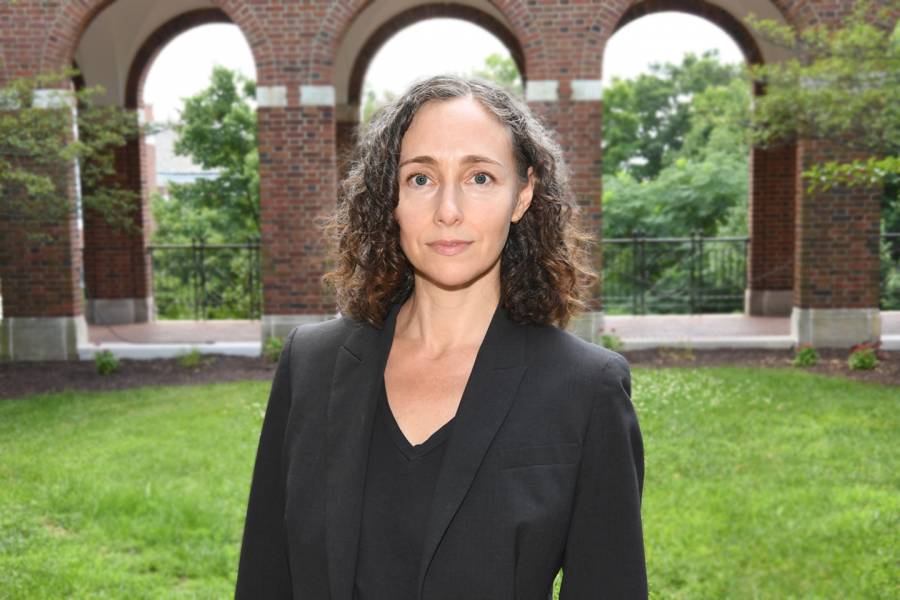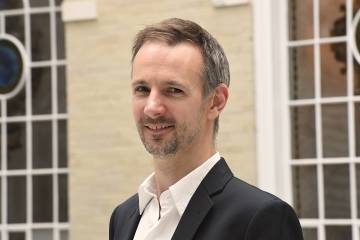Hanna Pickard remembers participating in lively dinner-table discussions as a kid. She'd listen closely as her parents, both law professors, debated abstract ideas of equality and justice as well as current issues like the finer points of nuclear disarmament, the ethics of trade embargoes with South Africa, and the viability of civil disobedience as a legitimate form of protest.
She was still a child when her mother engaged in civil disobedience to protest against nuclear disarmament in their hometown of Kingston, Ontario. The protest was picked up by the press and became a small local sensation. Pickard remembers the complicated emotions she felt as a result of her mother's actions.
"On the one hand I was incredibly proud of my mother," she says, "but on the other hand it was in the newspaper and people were very critical. It was a moment when a conflict between doing the right thing and feeling comfortable and untroubled in one's life was very present to me, and I began thinking about that sort of ethical dilemma."
Pickard, now a leading applied philosopher in the fields of philosophy of psychiatry and moral psychology, joins Johns Hopkins as a Bloomberg Distinguished Professor of philosophy and bioethics. She will hold joint appointments in the Department of Philosophy in the Krieger School of Arts and Sciences and in the Berman Institute of Bioethics.
Also see
"Through her work, Dr. Pickard shares profound insights into individual and collective human behavior," says Johns Hopkins University Provost Sunil Kumar. "We are thrilled to welcome her to our faculty, where her unique brand of applied philosophy will help us grapple with the pressing questions of our time and break new ground in a variety of interdisciplinary fields."
As the university's 45th Bloomberg Distinguished Professor, Pickard will join an interdisciplinary cohort of scholars at Johns Hopkins working to address major world problems and teach the next generation. The program is backed by a $350 million gift from Michael R. Bloomberg, a Johns Hopkins alumnus, founder of Bloomberg LP and Bloomberg Philanthropies, World Health Organization Global Ambassador for Noncommunicable Diseases, UN Secretary-General's Special Envoy for Climate Action, and former New York City mayor.
Pickard comes to Johns Hopkins from the University of Birmingham in the U.K., where she is Chair in Philosophy of Psychology, and from Princeton University, where she has served as a visiting research scholar in cognitive science for the past two years. Previously, she's been a research fellow at the University of Oxford and served for 10 years as an assistant team therapist at the Oxfordshire Complex Needs Service, where she worked clinically in an outpatient therapeutic community for patients with personality disorders and other complex mental health needs.
"Dr. Pickard's approach to research is applied philosophy at its finest," says Beverly Wendland, dean of the Krieger School. "Her expertise in philosophical analysis, psychiatry, and ethics has already laid the groundwork for important and pioneering work in the field of addiction, and we look forward to facilitating further collaborations between Dr. Pickard and members of the Krieger School and the Berman Institute of Bioethics."
Pickard's arrival will help broaden and intensify philosophical studies at Johns Hopkins, an effort that gained momentum last year with a $75 million gift from investor William Miller, Wendland added.
Through her applied approach to research, Pickard explores a range of areas, including mental health, addiction, clinical ethics, the self, and criminal law and policy. Currently, she leads a research project titled Responsibility Without Blame, which explores the counterproductive ways society responds to maladaptive behaviors such as crime or addiction.
In Pickard's view, typical social responses to behavior that's perceived as wrong or as causing harm fall into two categories: "rescue" or "blame." A "rescue" response casts people as victims of influences outside of their control—such as mental disorder or addiction—and casts others in the role of saviors. Although often well-meaning, this kind of response removes the active role people can—and often must—play in their own recovery or rehabilitation. A "blame" response, on the other hand, attributes agency to the person but withholds compassion, and often includes some form of social stigma or even punishment. It tends to be marked by overt hostility, Pickard says.
"Responsibility Without Blame allows us to occupy a middle ground," Pickard told the Biomedical Odyssey blog at the Johns Hopkins School of Medicine earlier this month. "We can hold someone responsible and develop practices of accountability without criticizing, punishing, and stigmatizing, but with compassion."
Although she developed the Responsibility Without Blame framework while working clinically at the Oxfordshire Complex Needs Service, she says she first became interested in mental health partly because of her family history.
"My uncle had paranoid schizophrenia," she says. "When he did things that were scary or difficult for me as a child or us as a family, it was all too easy to go one way or another and get trapped between extremes: either to fall into the 'rescue' response and put it all down to the illness, or to become quite blaming and rejecting.
"As a result of this trap, genuine relationships too easily get lost," she adds. "If you go to either of those extremes, you lose the capacity to relate to another as a person, and to support them."
The "rescue-blame trap" is especially evident in discussions of addiction, Pickard says. In recent years, a disease model of addiction has emerged with the goal of decoupling the condition from moral judgments and instead understanding addiction as a brain disease. But this model, Pickard says, negates scientific studies that suggest addicts retain the capacity to choose alternative goods or abstinence in a variety of scenarios. A degree of behavioral flexibility and goal-directedness endures, meaning addicts are not always acting simply because "they can't help it" or are "compelled" by their addiction.
"Once you see addiction as a disorder of choice and understand that the core question of addiction is explaining why people would make such harmful and self-destructive choices, then you see that there are almost as many answers to this question as there are individual people who suffer from addiction," she says.
Jeffrey Kahn, director of the Berman Institute of Bioethics, says Pickard's joint appointment will strengthen the institute's "vitally important connection" with the Department of Philosophy.
"We are thrilled about Hanna Pickard's appointment as a Bloomberg Distinguished Professor," he says. "Dr. Pickard's innovative work with Responsibility Without Blame provides a promising framework for addressing opioid addiction and other substance use disorders. Her research embodies the Berman Institute's emphasis on utilizing interdisciplinary approaches to explore contemporary ethical issues that take place in real-world circumstances."
Similarly, she's using her Responsibility Without Blame framework to advocate for a radical new approach to criminal justice. With Nicola Lacey, a professor of law at the London School of Economics, Pickard has authored a series of papers calling for the criminal justice system to establish two routes for delivering justice—one centered on justice for victims and one centered on responsibility and rehabilitation for offenders.
"Victims have their own distinctive needs to do with their well-being and the impact of the crime on their life, which we ought to be paying far more attention to than we do—indeed we typically neglect these needs precisely because we get so focused on making the perpetrator suffer," she says, arguing that a punitive justice system centered on the idea of offenders getting their 'just deserts' betrays the goals of offender rehabilitation and reintegration.
Pickard is working on a book about her Responsibility Without Blame framework and has introduced an e-learning platform for those interested in adopting the concept in mental health and affiliated fields. She publishes across philosophy, psychiatry, bioethics, and law journals, and is the co-editor of The Routledge Handbook of Philosophy and Science of Addiction. She received a Bachelor's degree in Philosophy from Queen's University in Canada and her Master's and Doctor of Philosophy degrees from the University of Oxford.
Pickard says she often collaborates on ideas with her husband, Ian Phillips, who will also join Johns Hopkins this summer as a Bloomberg Distinguished Professor with appointments in the Department of Psychological and Brain Sciences and the Department of Philosophy in the Krieger School. At heart, Pickard says, they are both deeply committed to combining traditional analytic philosophy with interdisciplinary scholarship, and they look forward to joining the Johns Hopkins community "in all its richness."
Of course, she adds, they often discuss philosophy at the dinner table, where their daughters listen in, just as Pickard did with her parents when she was a child.
"We'd be delighted if in 30 years our teenage daughters look back and see our discussions as formative in a good way as opposed to tedious and annoying," Pickard says. "We'll see."









